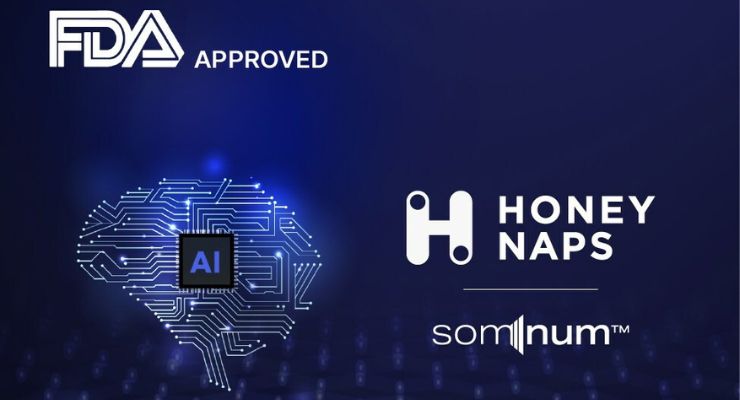Sam Brusco, Associate Editor09.25.23
HoneyNaps, an artificial intelligence (AI)-based sleep disorder diagnosis company, has gained U.S. Food and Drug Administration 510(k) clearance for its SOMNIUM AI sleep disease analysis algorithm.
HoneyNaps said it’s the first Korean company to be granted an FDA clearance for a sleep diagnosis solution.
SOMNUM leverages deep learning-based AI to execute real-time analysis of vast volumes of multi-channel/time series sleep biosignals. It’s powered by the company’s proprietary eXplainable Medical AI (XAI) technology.
Sleep biosignals include electroencephalograms, electrooculograms, chin and leg electromyograms, electrocardiograms, respiratory airflow and effort, oxygen saturation, posture, and snoring. These are monitored continuously as the patient sleeps to assess sleep status and disorder diagnosis, via polysomnography.

SOMNUM measures biosignals in real time to deliver fast, accurate diagnostic information for providers.
Even skilled clinicians can spend up to three to four hours reading polysomnography results. HoneyNaps believes AI systems have the potential to overcome staffing and time obstacles.
Professor Ji Ho Choi, Head of the Centre for Sleep Medicine at Soonchunhyang University Bucheon Hospital, told the press, "Like the AlphaGo case, which defeated humanity, this FDA approval is a very important event and a turning point in the field of sleep medicine in Korea. In the future, AI reading technology for biosignals is expected to play a very important role, similar to AI autonomous driving technology in cars. Furthermore, with the continuous improvement of biosignals AI reading technology, it will be possible to detect or predict some cardiovascular, neurological, and muscular diseases beyond the diagnosis of sleep disorders."
Tae Kyoung Ha, General Representative Director at HoneyNaps, added, "The FDA has recently strengthened its review of AI-based medical devices, and we passed the review in three years by conducting clinical trials with 400 subjects including U.S. citizens directly, rather than through an agency, from the validation stage. This is an opportunity for us to further enhance our technology, such as adding diagnostic functions for cardiovascular and neuromuscular diseases, and to accelerate our expansion into the global market."
HoneyNaps said it’s the first Korean company to be granted an FDA clearance for a sleep diagnosis solution.
SOMNUM leverages deep learning-based AI to execute real-time analysis of vast volumes of multi-channel/time series sleep biosignals. It’s powered by the company’s proprietary eXplainable Medical AI (XAI) technology.
Sleep biosignals include electroencephalograms, electrooculograms, chin and leg electromyograms, electrocardiograms, respiratory airflow and effort, oxygen saturation, posture, and snoring. These are monitored continuously as the patient sleeps to assess sleep status and disorder diagnosis, via polysomnography.

SOMNUM measures biosignals in real time to deliver fast, accurate diagnostic information for providers.
Even skilled clinicians can spend up to three to four hours reading polysomnography results. HoneyNaps believes AI systems have the potential to overcome staffing and time obstacles.
Professor Ji Ho Choi, Head of the Centre for Sleep Medicine at Soonchunhyang University Bucheon Hospital, told the press, "Like the AlphaGo case, which defeated humanity, this FDA approval is a very important event and a turning point in the field of sleep medicine in Korea. In the future, AI reading technology for biosignals is expected to play a very important role, similar to AI autonomous driving technology in cars. Furthermore, with the continuous improvement of biosignals AI reading technology, it will be possible to detect or predict some cardiovascular, neurological, and muscular diseases beyond the diagnosis of sleep disorders."
Tae Kyoung Ha, General Representative Director at HoneyNaps, added, "The FDA has recently strengthened its review of AI-based medical devices, and we passed the review in three years by conducting clinical trials with 400 subjects including U.S. citizens directly, rather than through an agency, from the validation stage. This is an opportunity for us to further enhance our technology, such as adding diagnostic functions for cardiovascular and neuromuscular diseases, and to accelerate our expansion into the global market."













